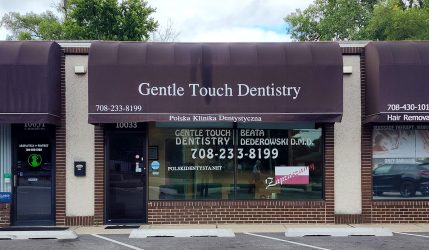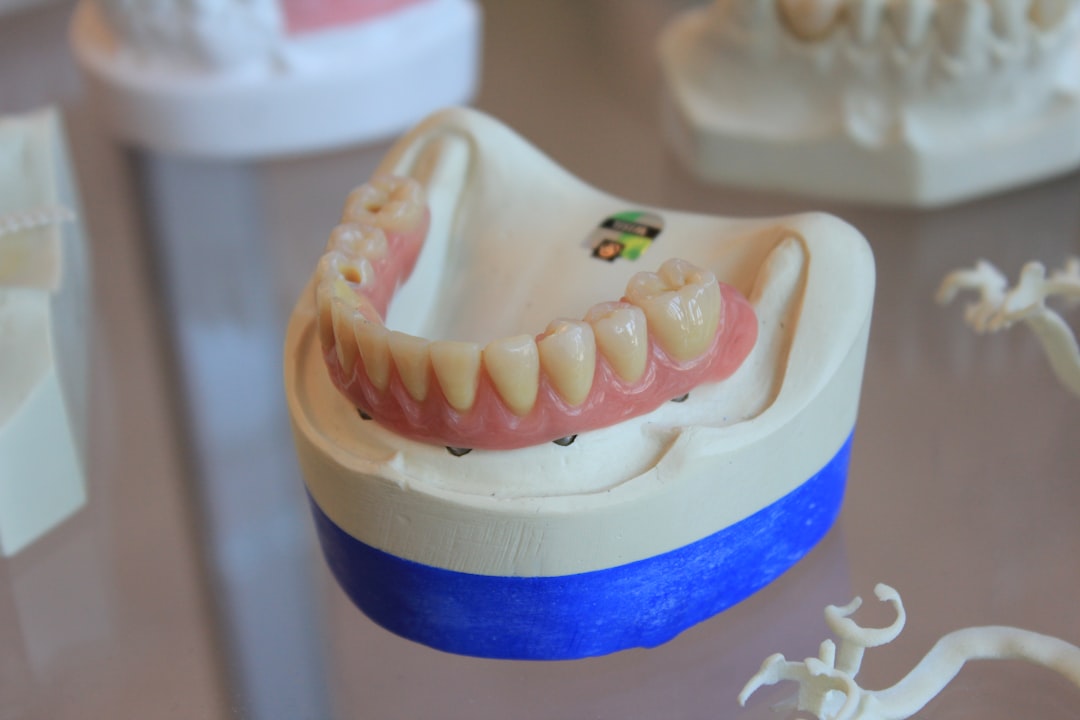When Your Dentures Start Moving Around
If your dentures don’t feel as secure as they once did, you’re not alone. Fixing loose dentures is a common concern we hear from patients.
Quick Solutions for Loose Dentures:
- Temporary fix: Use zinc-free denture adhesive for immediate stability
- Professional reline: Dentist reshapes the denture base for better fit
- Implant-supported dentures: Permanent solution using titanium posts
- New dentures: Complete replacement if current ones are worn out
- Avoid: DIY repair kits or household glues (these can be dangerous)
Loose dentures can make simple activities like eating, speaking, and smiling feel embarrassing. For many complete denture wearers, looseness is the primary cause of discomfort, especially when chewing.
When dentures slip or click, it’s a sign that your mouth has changed. The most common cause is bone resorption—the natural shrinkage of your jawbone after tooth loss because it’s no longer stimulated by tooth roots.
The good news is that fixing loose dentures doesn’t mean living with discomfort. Modern dentistry offers several effective solutions, from simple adjustments to permanent implant-supported options.
I’m Dr. Piotr Dederowski. At Lemont Dental Clinic & Gentle Touch Dentistry, we’ve helped many patients in Lemont and Palos Hills restore their confidence by fixing loose dentures. We know ill-fitting dentures affect your entire quality of life, not just your ability to eat.
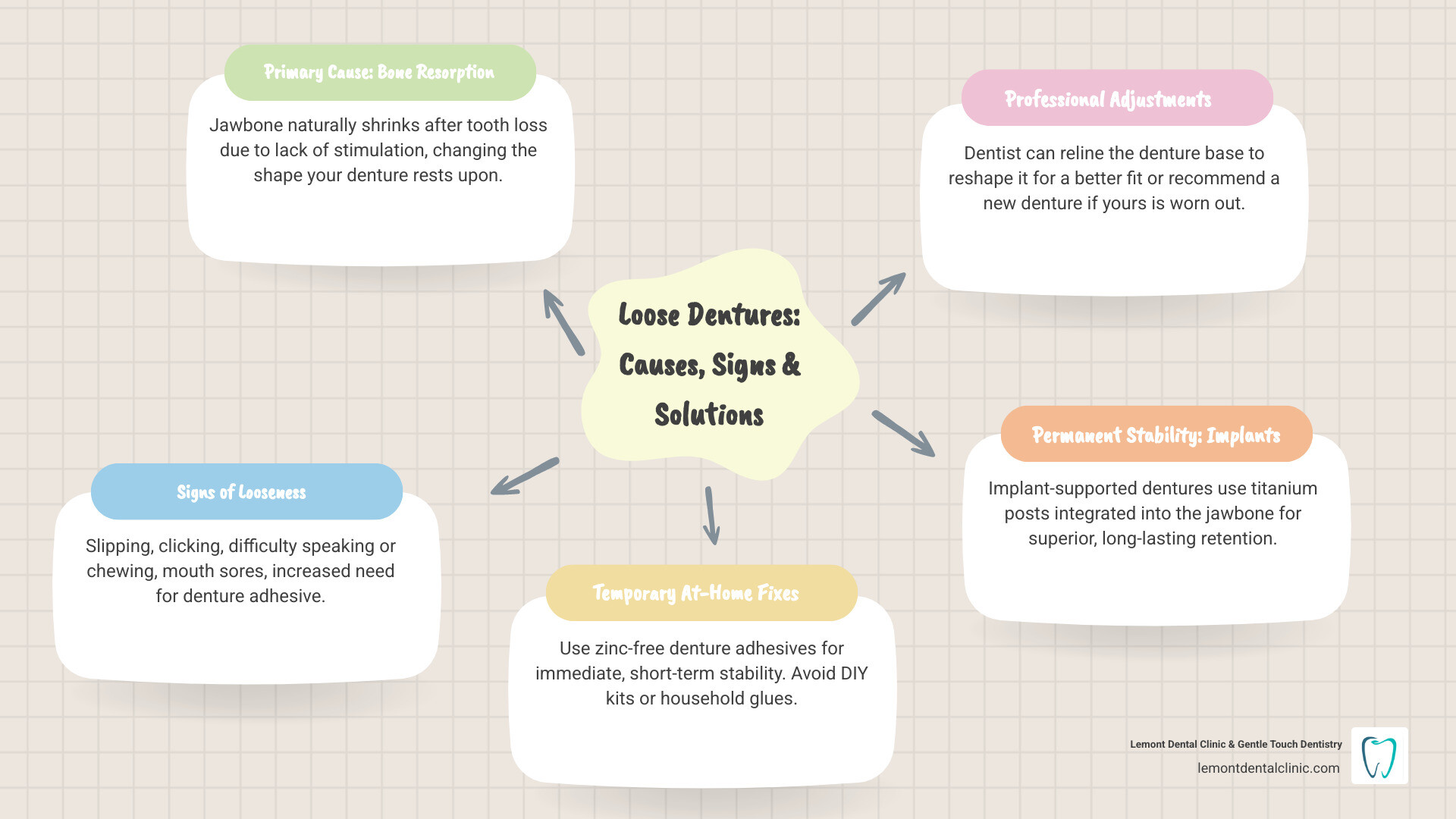
Why Your Dentures Don’t Fit Like They Used To
Even perfectly crafted dentures will loosen over time. This isn’t a flaw in the dentures, but a result of natural changes in your mouth.
The primary reason for loose dentures is bone resorption. After tooth loss, the jawbone is no longer stimulated by tooth roots and begins to shrink. This process changes the foundation your denture rests on, causing a once-snug fit to become loose.
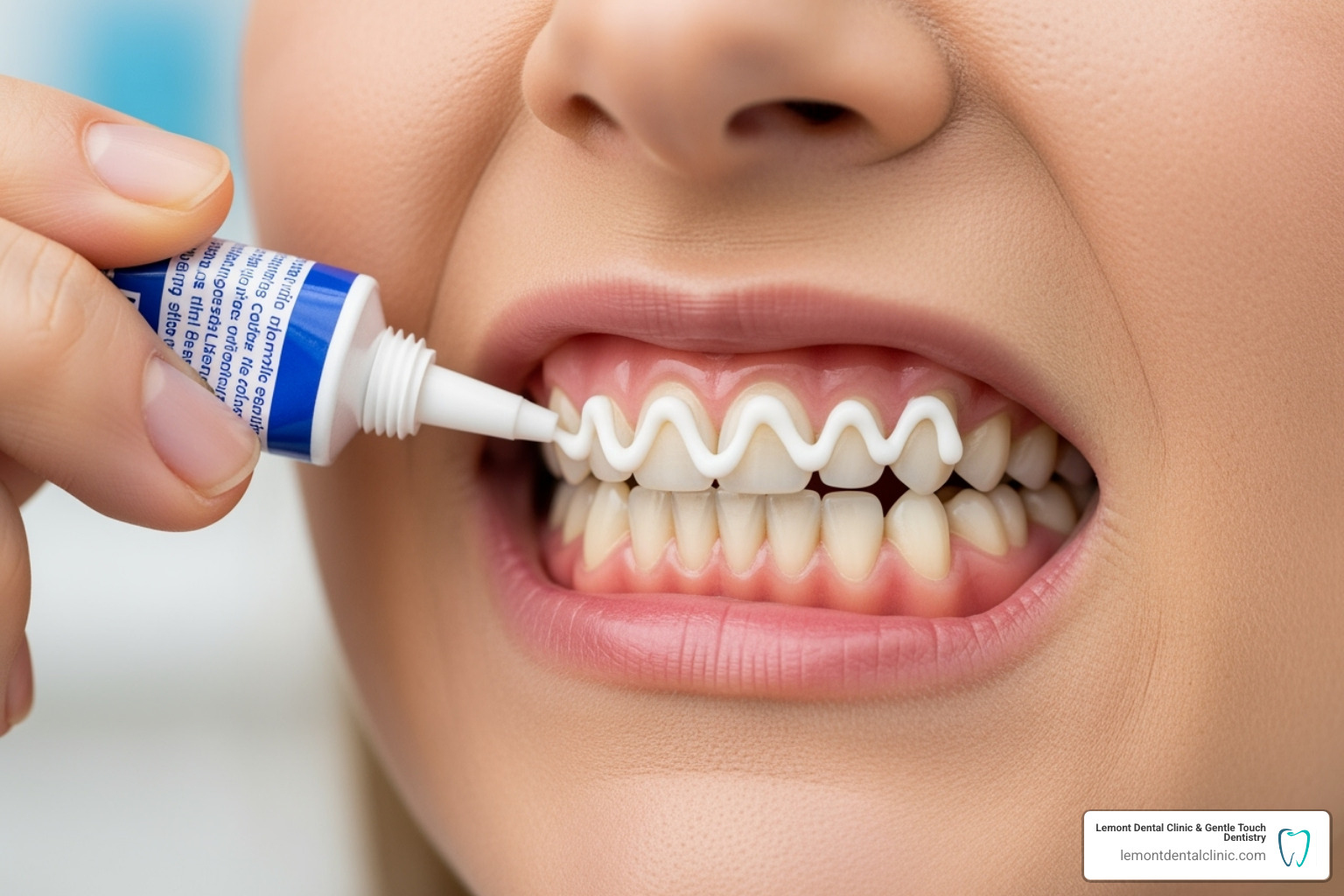
Other factors also contribute to a poor fit:
- Gum changes: The soft tissues in your mouth naturally shift and reshape over time.
- Wear and tear: Daily chewing and speaking can wear down the denture material, altering its shape.
- Weight fluctuations: Significant changes in weight can affect your facial structure and the soft tissues supporting your dentures.
- Denture lifespan: Most dentures last 5 to 10 years. After this period, material degradation and changes in your mouth often mean a replacement is the best way of fixing loose dentures.
Signs Your Dentures Are Loose
Your body gives clear signals when your dentures no longer fit correctly. Watch for these tell-tale signs:
- Slipping or clicking: Your dentures move when you talk, laugh, or cough.
- Difficulty speaking: You notice a lisp, slurring, or trouble forming words clearly.
- Trouble chewing: You avoid certain foods because chewing is difficult or uncomfortable.
- Mouth sores and gum irritation: Ill-fitting dentures rub against your gums, causing painful spots.
- Bad breath: Gaps under loose dentures trap food and bacteria, causing unpleasant odors.
- Increased adhesive use: You need to use more adhesive, or reapply it multiple times a day, to keep your dentures in place. This is a clear sign it’s time for professional help with fixing loose dentures.
If these issues sound familiar, we can assess your denture fit and recommend the best solution.
The Risks of Wearing Ill-fitting Dentures
Ignoring loose dentures can lead to serious health problems that affect your entire well-being. Ill-fitting dentures create a domino effect that goes beyond simple inconvenience.
Gum inflammation and painful mouth ulcers are common. The constant rubbing of a loose denture irritates delicate gum tissue, creating sores that can become infected. Over time, this can lead to a “flabby ridge,” where gum tissue becomes soft and unstable, making a good fit even harder to achieve.
Fungal infections, like denture stomatitis, can thrive in the warm, moist space under an ill-fitting denture where food and moisture get trapped.
Nutritional issues arise when chewing becomes a frustrating battle. You may start avoiding healthy, harder-to-chew foods, which can affect your overall digestion since proper breakdown of food starts in the mouth.
Trying to hold unstable dentures in place can lead to jaw pain and TMD (Temporomandibular Disorder). This constant strain can cause headaches, neck pain, and aching jaw joints.
Perhaps the most serious consequence is social withdrawal. A study published in BMC Oral Health revealed that people with ill-fitting dentures experience higher levels of depression and anxiety. Worrying about dentures slipping can cause people to avoid social situations, stop smiling, and withdraw from family and friends. The psychological impact is significant.
For more information, you can review this scientific research on the psychological impact of ill-fitting dentures.
The good news is that all these problems are preventable. At Lemont Dental Clinic & Gentle Touch Dentistry, we’ve seen how fixing loose dentures can restore a patient’s health and confidence.
Temporary At-Home Adjustments (And What to Avoid)
If your dentures feel loose, there are safe, temporary measures you can use while you schedule a dental visit. These are not permanent solutions for fixing loose dentures.
Denture adhesives (creams, powders, or strips) are the safest temporary fix. They create a temporary bond to improve stability. For best results, apply a small amount to clean, dry dentures as directed by the manufacturer. Using too much can be counterproductive and feel bulky.
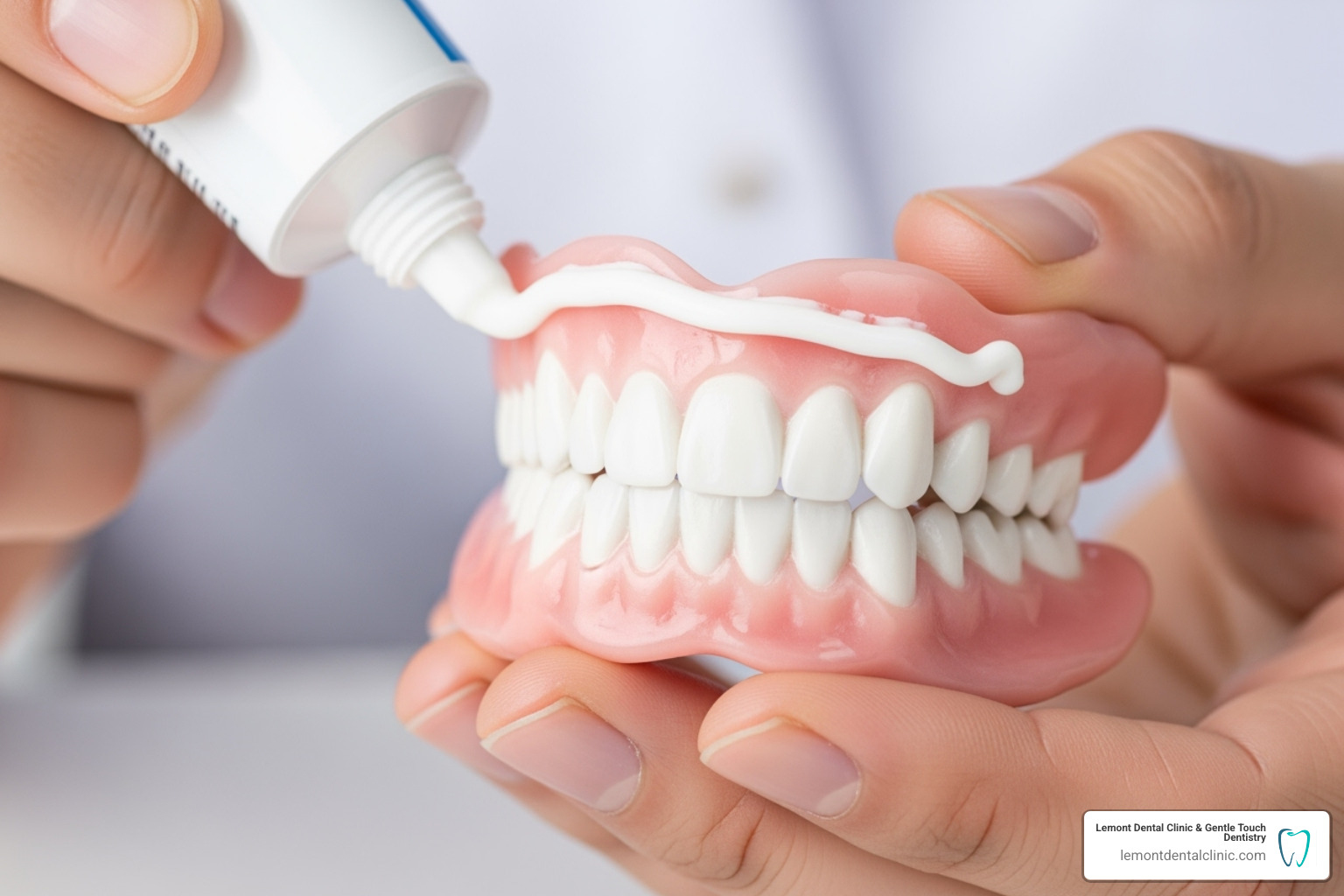
The Role of Denture Adhesives
Adhesives provide a temporary grip, boost confidence, and create a seal to block food particles. While even some people with well-fitting dentures use them for extra security, daily reliance is a sign you need professional help. When shopping, always look for zinc-free formulas to avoid any potential health concerns associated with older products.
Now, let’s talk about what you should absolutely avoid when trying to manage loose dentures at home. These DIY attempts can create much bigger problems.
- DIY reline kits: These kits from the pharmacy rarely provide a good fit. They can cause irritation, harbor bacteria, and may make professional adjustments more difficult later.
- Household glues: Never use super glue or other household adhesives. They are toxic, not designed for oral use, and can cause serious damage to your mouth and your dentures.
These temporary solutions are just bridges to help you feel more comfortable while you arrange for proper professional care.
Professional Methods for Fixing Loose Dentures
When temporary fixes aren’t enough, professional solutions are necessary for fixing loose dentures. At Lemont Dental Clinic & Gentle Touch Dentistry, we begin with a thorough consultation to examine your dentures, gums, and jaw structure. This allows us to find the root cause of the problem and recommend the best long-term solution for you.

You can learn more about our comprehensive approach by exploring Our Services, where we combine experience with technology for effective solutions.
When to See a Dentist About Your Loose Dentures
The longer you wait, the more complex the solution may become. Give us a call if you experience any of the following:
- Persistent looseness: Your dentures feel unstable most of the time.
- Adhesive dependence: You need adhesive every day to function.
- Pain or discomfort: You have sore spots or constant irritation.
- Visible damage: You notice cracks, chips, or broken parts on your dentures.
- Difficulty eating or speaking: You avoid certain foods or have trouble speaking clearly.
If you’re wondering What to do after finding a dentist near me?, the answer is to schedule a consultation.
Denture Relining: A Common Method for fixing loose dentures
Denture relining reshapes the inside surface of your denture to match the current contours of your mouth. It’s a highly effective method for fixing loose dentures caused by natural changes in your gums and jaw.
- A hard reline uses a durable acrylic material for a snug, long-lasting fit that can last for years.
- A soft reline uses a pliable, cushioning material that is gentler on sensitive tissues, though it may need to be replaced more often.
Relining restores a secure fit, improving comfort and function. Learn more about What happens during a denture reline?
Implant-Supported Dentures: The Ultimate Solution
For a permanent solution, implant-supported dentures are the gold standard. This process involves placing small titanium posts into your jawbone. Through a process called osseointegration, your jawbone fuses with the implants, creating an incredibly strong and stable foundation.
The result is superior stability with no slipping, clicking, or need for adhesives. Patients can eat, speak, and laugh with total confidence. Implants also provide jawbone preservation, stimulating the bone like natural teeth to help maintain your facial structure. Chewing efficiency improves dramatically, allowing for a better diet.
We offer several types of Implant Dentures. You can also explore the Benefits of implant-supported dentures to see if this life-changing solution is right for you.
Replacing Your Dentures
Sometimes, the best way of fixing loose dentures is to replace them, especially if they are past their typical 5 to 10-year lifespan. Signs it’s time for a replacement include:
- Worn-down teeth that reduce chewing efficiency.
- Loss of facial support, making your face appear sunken.
- Persistent discomfort that adjustments can’t fix.
Creating new dentures involves taking fresh impressions to ensure a precise, custom fit. To understand your options, see our guide on Types of Dentures and Cost.
Frequently Asked Questions about Loose Dentures
We understand you might have more questions about managing and fixing loose dentures. Here are some common inquiries we receive.
How can I prevent my dentures from becoming loose?
While some changes are unavoidable, proactive steps can help maintain the fit of your dentures:
- Proper daily cleaning: Use a soft brush and non-abrasive denture cleanser to remove plaque and food.
- Soaking overnight: Keep dentures in water or a soaking solution to prevent warping. Avoid hot water.
- Regular dental check-ups: Visit us regularly to monitor the fit and make minor adjustments before major problems arise.
- Handling with care: Clean dentures over a towel or basin of water to prevent breakage if dropped.
- Healthy lifestyle: Maintaining a stable weight and healthy diet supports the health of your gums and jawbone.
How often should my dentures be relined?
The frequency depends on your individual rate of bone loss.
- Soft relines are more temporary and may need to be redone every few months to a year.
- Hard relines are more durable and typically last one to two years, but this can vary.
During your check-ups, we will monitor the fit and advise you when a reline is needed to maintain optimal comfort.
Is it safe to repair my own broken or loose dentures?
No, it is not safe to repair your own dentures. Attempting a DIY fix can be dangerous and often makes the problem worse.
- Household glues are toxic and can cause chemical burns or allergic reactions.
- DIY repair kits rarely fit correctly and can lead to severe gum irritation, sores, and even accelerated bone loss.
- DIY attempts can cause permanent damage, making a professional repair impossible.
If your dentures are broken or loose, please contact us immediately. We have the proper tools and biocompatible materials for safe, effective repairs and adjustments.
Reclaim Your Confidence with a Secure Smile
You don’t have to live with the worry and discomfort of loose dentures. At Lemont Dental Clinic & Gentle Touch Dentistry, we want you to know that loose dentures are a clear sign that something has changed in your mouth, and more importantly, they’re a problem we can solve.
Denture adhesive is a temporary bandage on a bigger issue. Relying on it daily masks underlying problems that need professional attention and can worsen over time.
Professional help is the key to getting your life back. Our experienced team in Lemont and Palos Hills understands that fixing loose dentures is about restoring your confidence, your ability to enjoy meals, and your freedom to laugh without worry.
Modern solutions like a precise reline that gives your current dentures a snug fit, or the life-changing stability of implant-supported dentures, are available for virtually every situation and budget. Imagine biting into an apple without hesitation and speaking clearly—this change is possible.
Don’t let wobbly dentures control another day of your life. Contact Us today to schedule a consultation where we can assess your unique situation and discuss all your options. If you’re ready to explore the most permanent solution available, learn how dental implants can provide the rock-solid foundation your smile deserves.
Your confident smile is waiting – let’s help you reclaim it.

